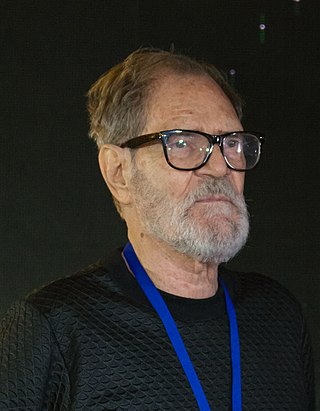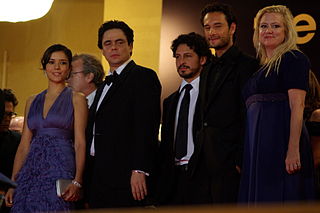Related Research Articles

The Moscow International Film Festival is a film festival first held in Moscow in 1935 and became regular since 1959. From its inception to 1959, it was held every second year in July, alternating with the Karlovy Vary festival. The festival has been held annually since 1999. In reaction to the 2022 Russian invasion of Ukraine, the FIAPF paused the accreditation of the festival until further notice.

Angélica Espinoza Stransky, known as Angélica Aragón, is a Mexican film, television and stage actress and singer. She is daughter of the Mexican composer José Ángel Espinoza "Ferrusquilla". She is recognized for her performances in various Mexican film productions such as Cilantro y perejil (1997), Sexo, pudor y lágrimas (1999) and El crimen del Padre Amaro (2002) and in diverse American productions like A Walk in the Clouds (1995) and Dirty Dancing: Havana Nights (2002) among others. She is also famous for having starred in two famous Mexican telenovelas: Vivir un poco (1985) and Mirada de mujer (1997).

Luis Alcoriza de la Vega was a respected Mexican screenwriter, film director, and actor.

Fernando Ayala was an Argentine film director, screenwriter and film producer of the classic era. He is widely considered one of the most important Argentine film directors and producers in the history of the cinema of Argentina.

Pierre Bruno Hugo Fontana, otherwise known as Hugo del Carril, was an Argentine film actor, film director and tango singer of the classic era.

Alejandro Sieveking Campano was a Chilean playwright, theatre director and actor.

Fernando Siro was an Argentine film actor, film director and screenwriter.

José Enrique Benito y Emeterio Ysbert Alvarruiz, also known as José Isbert and/or Pepe Isbert, was a Spanish actor.

Juan Echanove Labanda is a Spanish actor.
El día que murió el silencio is a 1997 Bolivian drama film directed by Paolo Agazzi.

Thinking about the immortality of the crab is a Spanish idiom about daydreaming. The phrase is usually a humorous way of saying that one was not sitting idly, but engaged constructively in contemplation or letting one's mind wander.

Jaime Rosales is a Spanish film director, screenwriter and film producer.
Sena/Quina, la inmortalidad del cangrejo is a film written and directed by Paolo Agazzi.

Película is a Spanish film festival held every October by the Instituto Cervantes de Manila, in collaboration with the Embassy of Spain to the Philippines. Created in 2002, this event shows award-winning Spanish and Latin American films.

Cristian Mercado is a Bolivian theater and film actor.
My Friend is a 1983 Bolivian drama film directed by Paolo Agazzi. It was entered into the 13th Moscow International Film Festival.

Paulina García Alfonso, better known as Pali García, is a Chilean actress, stage director, and playwright.

The Cinema of Bolivia comprises the film and videos made within the nation of Bolivia or by Bolivian filmmakers abroad. Though the country's film infrastructure is too small to be considered a film industry, Bolivia has a rich film history. Bolivia has consistently produced feature-length films since the 1920s, many of which are documentary or take a documentary approach to their subject. Film historian José Sánchez-H has observed that the predominant theme of many Bolivian films is the country's indigenous cultures and political oppression.

Jorge de Juan García is a Spanish film and theatre actor, producer and director, known artistically as Jorge de Juan. In 2016 he founded the Spanish Theatre Company (STC) which is the first charity in the history of the British theatre dedicated to the production of both Spanish and Latin-American plays at the Cervantes Theatre of London. This theater was created as well by Jorge de Juan as the home of the Spanish Theatre Company.
David Valdelvira is a Spanish actor, theatre pedagogue, dramaturge and theatre director.
References
- ↑ "13th Moscow International Film Festival (1983)". MIFF. Archived from the original on 7 November 2013. Retrieved 2 February 2013.
- ↑ Sena Quina, La inmortalidad del Cangrejo Archived 28 September 2007 at the Wayback Machine
- ↑ Sena/Quina, la inmortalidad del cangrejo at IMDb